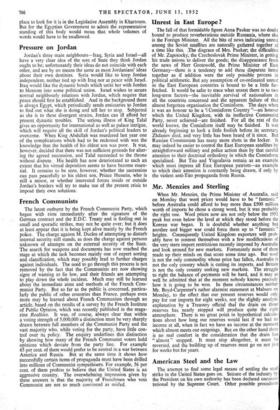Mr. Menzies and Sterling
When Mr. Menzies, the Prime Minister of Australia, said on Monday that wool prices would have to be "fantastic" before Australia could afford to buy more than £.500 million worth of imports he chose a strong word, but it was probably the right one. Wool prices now are not only below the 1951 ' peak but even below the level at which they stood before the Korean war began. It is doubtful whether anything but another and bigger war could force them up to "fantastic" heights. Consequently United Kingdom exporters will prob- ably have to content themselves with a few modifications of the very stern import restrictions recently imposed by Australia and look around for new markets. Fortunately most of them made up their minds on that score some time ago. But wool is not the only commodity whose price has fallen, Australia is not the only country which is cutting its imports, and Britain is not the only country seeking new markets. The struggle to right the balance of payments will be hard, and it may as well be admitted that at the moment nobody knows precisely how it is going, to be won. In these circumstances neither Mr. Boyd-Carpenter's rather alarmist statement at Malvern on Monday,. to the effect that our present reserves would only pay for our imports for eight weeks, nor the slightly anodyne explanation by a Treasury official that the drain on those reserves has nearly stopped will produce quite the right atmosphere. There is no great point in hypothetical calcula- tions about how long our reserves would last if we had no income at all, when in fact we have an income at the moment which almost meets our outgoings. But on the other hand there is no real comfort in the consideration that the drain has " almost " stopped. It must slop altogether, it must be reversed, and the building up of reserves must go on not just for weeks but for years.


































 Previous page
Previous page